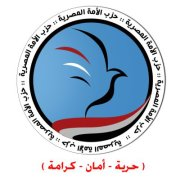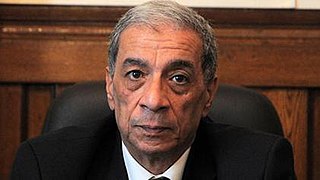Related Research Articles
Liberalism in Egypt or Egyptian liberalism is a political ideology that traces its beginnings to the 19th century.

Presidential elections were held in Egypt in 2012, with the first round on 23 and 24 May 2012 and the second on 16 and 17 June. They were the first democratic presidential elections in Egyptian history. The Muslim Brotherhood declared early 18 June 2012, that its candidate, Mohamed Morsi, won Egypt's presidential election, which would be the first victory of an Islamist as head of state in the Arab world. It was the second presidential election in Egypt's history with more than one candidate, following the 2005 election, and the first presidential election after the 2011 Egyptian revolution which ousted president Hosni Mubarak, during the Arab Spring. However, Morsi's presidency was brief and short-lived, and he later faced massive protests for and against his rule, only to be ousted in a military coup in July that year.

The Free Egyptians Party is an Egyptian liberal party, founded after the 2011 Egyptian revolution. It supports the principles of a liberal, democratic, and secular political order in Egypt. The Free Egyptians Party was the largest party in the House of Representatives. The party is a founding member of Al Hurriya Liberal Network.

Hazem Salah Abu Ismail is an Egyptian lawyer, television preacher, and former presidential candidate. He was a host on The Fadfada Show which aired on Al-Nas Channel and is the founder of the Flag Party.
The al‑Nour Party, or "Party of The Light", was one of the political parties created in Egypt after the 2011 Egyptian Revolution. It has an ultra-conservative, Islamist ideology, which believes in implementing strict Sharia law. It has been described as the political arm of the Salafi Call Society, and "by far the most prominent" of the several new Salafi parties in Egypt, which it has surpassed by virtue of its "long organizational and administrative experience" and "charismatic leaders". Its political aim is to establish a theocratic state on the lines of Wahhabism like in Saudi Arabia. Saudi Arabia was found to be the main financer of the party according to the public German television news service ARD.
Salah Abdel Maqsoud was the minister of information of Egypt as part of the Qandil Cabinet.

The Egyptian Umma Party or Egyptian Nation Party was a political party in Egypt, founded by supporters of presidential candidate Hazem Salah Abu Ismail in 2012. Abu Ismail himself has, however, not joined the party itself. Abu Ismail announced on 17 December 2012 that the party would compete for all of the seats in the 2013 parliamentary election. The party is one of a network of three parties. The name of the party was changed to the Flag Party in 2013.

Ansar al-Sharia in Libya was an Al-Qaeda-aligned Salafi Jihadist militia group that advocated the implementation of Sharia law across Libya. Ansar al-Sharia came into being in 2011, during the Libyan Civil War. Until January 2015, it was led by its "Amir", Muhammad al-Zahawi. As part of its strategy, the organization targeted specific Libyan and American civilians for death and took part in the 2012 Benghazi attack. The group was designated as a terrorist organization by the United Nations, Iraq, Turkey, the United Arab Emirates, the United Kingdom and the United States.

The Virtue Party is a Salafist political party. The party stated in September 2012 that it and the Renaissance Party would merge.

The Islamic Party is an Islamist political party in Egypt. The name of the party was changed in approximately December 2012. The main leaders of the group are Mohamed Abu Samra and Kamal Habib. The party is backed by the Egyptian Islamic Jihad group. Most of the founders of the party are former members of the organization. Many members of the party have court rulings that bar them from running for elected office.

The National Salvation Front is an alliance of Egyptian political parties, formed to defeat Egyptian President Mohammed Morsi's 22 November 2012 constitutional declaration. The National Front for Salvation of the Revolution has more than 35 groups involved overall. Observers are concerned that the NSF will not be able to become a coherent political force because the different parties agree on opposing Morsi, but their views on other subjects diverge.
The Free Nation Coalition is an Islamist electoral alliance in Egypt. Although the Authenticity Party and Flag Party initially joined the alliance, they later joined the Nation Alliance.
The Flag Party is a Salafist political party in Egypt. It was founded in 2013 and is headed by Hazem Salah Abu Ismail.

The Anti-Coup Alliance is a coalition in Egypt formed to reverse the ouster of former president Mohamed Morsi. The coalition is made up of approximately 40 Islamist parties and groups.

Protests against the 2013 Egyptian coup d'état erupted in July 2013. Immediately following the removal of President Mohamed Morsi by the Egyptian Armed Forces on 3 July 2013 amid demonstrations against Morsi's rule, many protesters amassed near the Rabia Al-Adawiya Mosque to call for Morsi's return to power and condemn the military, while others demonstrated in support of the military and interim government. Deadly clashes such as Rabaa massacre continued for several days, with three particularly bloody incidents being described by officials as "massacres" perpetrated by security forces. During the month of Ramadan, prime minister Hazem al-Beblawy threatened to disperse the ongoing Pro-Morsi sit-ins in Rabaa al-Adaweya square and al-Nahda square. The government crackdown of these protests occurred in a violent dispersal on 14 August 2013. In mid-August, the violence directed by the army towards the protesters escalated, with hundreds killed, and the government declaring a month-long nighttime curfew.

Hisham Muhammad Zaki Barakat was Prosecutor General of Egypt from 2013 to 2015. During his term as state prosecutor, he was responsible for thousands of controversial prosecutions, including several widely deemed politically motivated resulting in death sentences for hundreds of Muslim Brotherhood members and supporters of deposed Egyptian President Mohamed Morsi. He was assassinated in a car bombing on 29 June 2015.
The Salafist Front is an Egyptian Salafi Islamist organization that was founded after the 2011 Egyptian revolution after breaking away from the Salafist Call. It has been called "one of the largest Salafist associations in the Middle East". The organization was part of the Anti-Coup Alliance, though it announced on 4 December 2014 that it had withdrawn from the alliance. It has also been described as one of the most revolutionary Islamist movements in Egypt.
A political crisis evolved in Tunisia following the assassination of leftist leader Mohamed Brahmi in late July 2013, during which the country's mainly secular opposition organized several protests against the ruling Troika alliance that was dominated by Rashid al-Ghannushi's Islamist Ennahda Movement. The events came as part of the aftermath of the Tunisian Revolution which ousted the country's longtime president Zine El Abidine Ben Ali, followed by a general election which saw Ennahda win a plurality alongside Moncef Marzouki's allied Congress for the Republic (CPR). The crisis gradually subsided when Prime Minister Ali Laarayedh resigned and a new constitution was adopted in January 2014.

The Sheikh Omar Hadid Brigade, also known as Islamic State in Gaza, is an Islamist militant group affiliated with the Islamic State in Iraq and the Levant that was reportedly active in the Gaza Strip around 2015. Its goals have consistently matched those of the Islamic State, in that it seeks to establish the al-Sham caliphate. As such, it opposes all forms of Palestinian nationalism while also supporting the elimination of all Jews and other ethno-religious 'infidels' from the region.
References
- 1 2 "Abu Ismail initiates Al-Raya Party". Daily News Egypt. 27 February 2013. Retrieved 13 December 2013.
- ↑ "Islamist groups support police". Daily News Egypt. 10 March 2013. Retrieved 13 December 2013.
- 1 2 "Egypt's Salafis Emerge As Powerful And Controversial Political Force". NPR. 28 January 2013. Retrieved 13 December 2013.
- ↑ "Morsy will call for parliamentary elections in June, says newspaper". Egypt Independent. 29 December 2012. Retrieved 13 December 2013.
- ↑ "Islamist political parties form alliance". Ahram Online. 9 March 2013. Retrieved 13 December 2013.